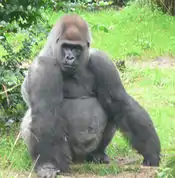Primate
The word primate has two definitions, if not more:
- In zoology and most commonly, primate refers to the order of mammals that have several physical characteristics in common:
- Two forward-facing eyes: this allows primates to have vision with depth perception (binocular vision). Having two forward-facing eyes also allows primates to focus at close range on objects — books for example — and study them.
- Primates have relatively large brains compared to other mammals.
- Most primates have hands (and sometimes feet) with opposable thumbs, rather than paws, allowing them to grasp, hold and carry objects — again, books for example.
- Humans are the most common primates. Primates are divided into apes, monkeys, and prosimians (e.g. lemurs).
- In religion, primate refers to the top-ranking bishop or archbishop in a province, region or country. This type of primate usually also belongs to the zoological kind defined above, though it's not inconceivable that at some point in history another kind of animal, such as a dolphin or a goat, might be chosen as primate of a particular region.
| We're all Homo here Evolution |
| Relevant Hominids |
| A Gradual Science |
| Plain Monkey Business |
v - t - e |
Varieties of primate
Apes

There are two main groups of apes:
- Hylobatidae, also known as the "lesser apes", which consist of 13 different species of gibbons.
- Hominidae
File:Wikipedia's W.svg , also known as the "great apesFile:Wikipedia's W.svg ", which consist of orangutans, gorillasFile:Wikipedia's W.svg , chimpanzees, bonobos and humans.
Most modern ape species have a fairly thick coating of hair over most of their bodies - with humans being a notable exception (they do have a covering of hair, but for most, it's so thin, it's virtually unnoticeable). Lesser apes are generally fairly small and agile, able to swing from branch to branch in trees at speeds of up to 35 mph, whereas the great apes tend to spend more time on the ground and travel by walking (though they still do climb trees as a normal part of their behaviour, for one reason or another). Lesser apes also differ from greater apes in that lesser apes generally do not make nests (or, in the case of humans, houses) and more closely resemble monkeys than the greater apes do.
The calls of the lesser apes can be very complex and are generally used to indicate territory, as mating calls or to advertise pair bonds.[1] Many great apes are generally very quiet, and even on occasions when they are not, they generally make noise by banging large branches around or by beating their chests. Although their vocalisations can be quite complex, they are usually not as much so as those of humans or of the lesser apes.
Grooming is also very important to apes, and a great deal of time is spent on this, with an ape allowing another to groom him or her usually being a sign of companionship or trust.
Great apes are generally more intelligent than most other animals, to the degree that they have been known to use tools. For example, chimpanzees have been known to thrust sticks into termite mounds in order to eat the termites that remain on the stick when they pull it back out; orangutans have been known to hold large leaves over their heads to keep the rain off them, much like umbrellas; and humans have been known to send communication satellites into geostationary orbit to allow them to watch Top Gear anywhere in the world.
Orangutans
Orangutans
Humans and orangutans share 97% of the same genetic information.[2] It is estimated that the human lineage diverged approximately 13 million years ago, compared to diverging from the chimpanzee lineage approximately 6 million years ago.[3] One controversial study of note has made a claim that orangutans are more closely related to humans than chimpanzees, asserting that humans and orangutans share more physical features and that previous genetic studies were flawed. This claim is not widely accepted and the study has been widely panned.[4]
Chimpanzees
Bonobos
Humans
The other primates

Confusion about the meaning and the usage of the word "primate" occurred on 16 July 2007 when noted Roman Catholic intellectual Bill O'Reilly of Fox News became incensed over a posting on the Daily Kos website, calling Pope Benedict XVI a "primate". Fox News dispatched hit-and-run reporter Jesse Watters to interview David Barger, CEO of JetBlue, one of Daily Kos' sponsors. Watters asked Barger a series of questions about Daily Kos' political viewpoints, including several about the statement (posted by on a comment board by one of Daily Kos' readers) that the Pope is a primate. If O'Reilly and Watters had bothered to look up the word "primate" in any English-language dictionary, they would have seen that the Pope — and every other pope in history — meets both definitions of "primate". From this encounter we can deduce that the use of — and familiarity with — dictionaries is not required to work at Fox News. You only need an amped-up sense of righteous indignation. (Perhaps they eschew the use of dictionaries to demonstrate that they are not primates. Or they distrust the lexicographic conspiracy.)
Note to Fox News employees: Dictionaries are a type of book. If you wish to know the definitions to difficult words like "zoology", "lemurs", and "eschew" or to words you think you know the definitions of — for instance, "fair" and "balanced" — you'll have to go find a dictionary and look those words up yourselves.[note 1]
Notes
- For more information, go here.